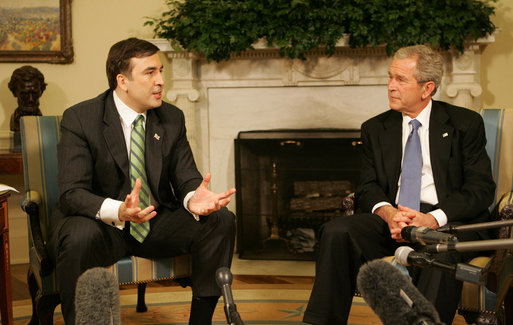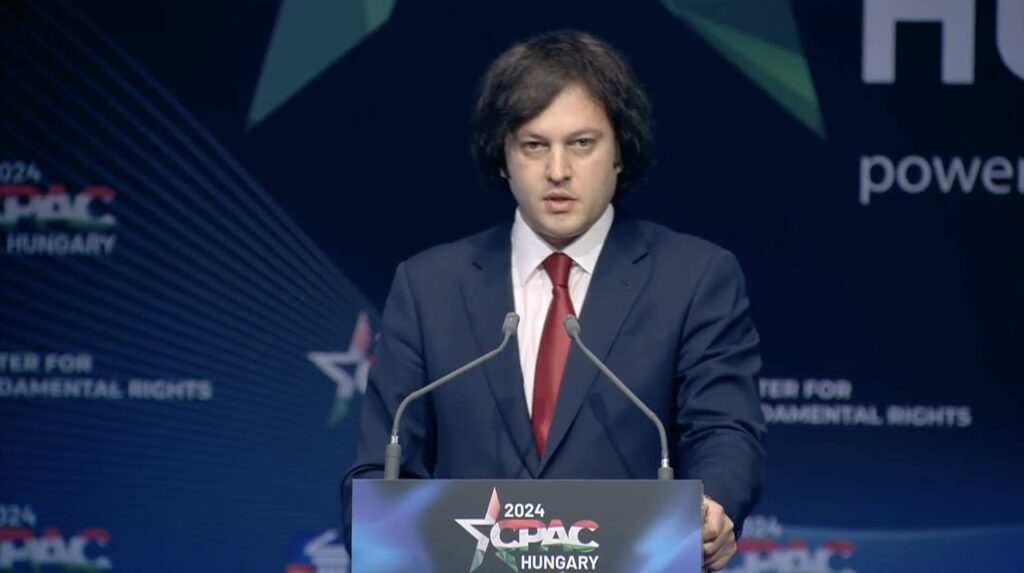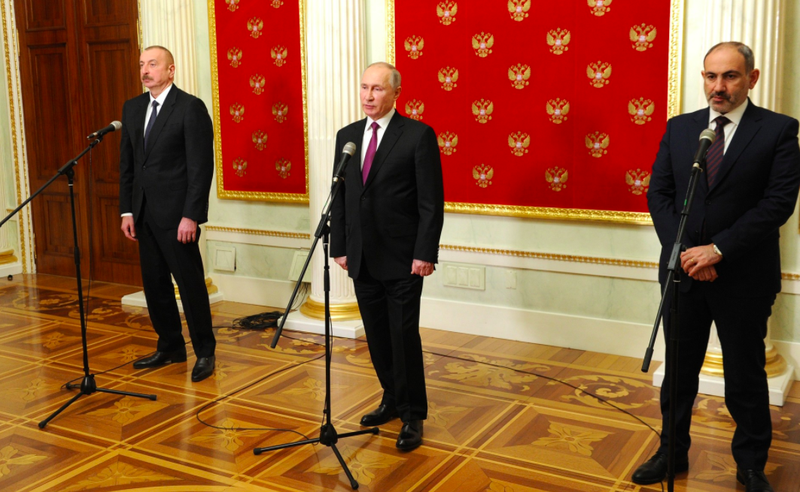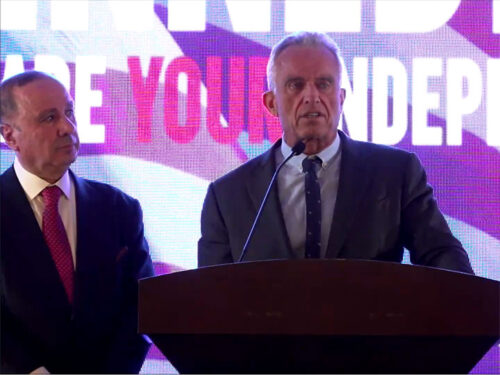
US President-elect Donald Trump’s proposed foreign policy positions have often been vague, but can generally be understood as being based on a larger pivot toward isolationism. US disengagement from the South Caucasus, or an actual policy of tacit approval for authoritarianism, will redefine Washington’s role in the region.
Trump is not known for his detailed foreign policy positions in general, and much less when it comes to the regions of the world considered more peripheral to US interests, such as the South Caucasus. While one can look back at how his administration acted in his first term, Trump’s reelection is likely to entail a doubling-down on his isolationist tendencies, and without the guardrails that stemmed from the experienced diplomats who served in the State Department before.
Unpredictability is one of Trump’s defining features, so it is difficult to create a realistic prognosis of how his administration will approach the South Caucasus. Nonetheless, it is still possible to make some general predictions about what direction he may take based on his previous patterns and the few statements he and his affiliates have made about the region.
Georgia
While relations have ebbed in recent years, the US has long viewed Georgia as its strongest partner in the region. Under the United National Movement (UNM) government and President Mikheil Saakashvili, Georgia aggressively pursued closer ties with the US, which Washington was happy to reciprocate, seeking a foothold in an area seen at the time as Russia’s backyard.

The subsequent Georgian Dream government’s increasingly authoritarian tilt and associated democratic backsliding has changed that calculus and created friction between Washington and Tbilisi. Georgian politicians, including party leaders, have regularly denigrated US officials and institutions active in the country, going as far as to insinuate the US was somehow involved in a potential coup attempt.
But given Trump’s general lack of interest in maintaining relations with long-time allies, and a tendency to view diplomacy in a transactional manner, it is unclear where Georgia will fall on his administration’s priority list.
The first issue that is likely to come up is the October parliamentary elections, which both the Georgian opposition and many European countries have said was marred by electoral fraud and rigging in favour of Georgian Dream.
President Joe Biden’s administration has so far refrained from declaring outright that the election was illegitimate, but pressure has been mounting for such a move to be made before Trump is inaugurated in January 2025.
According to Kornely Kakachia, the founder of the Georgian Institute of Politics, this would be the preferable approach, as he said there is still an implicit understanding in the State Department that such decisions are passed on to following administrations.
Trump could certainly reverse course and nullify a declaration that the election was illegitimate, but he also may simply not be bothered to take an active stance.
The final OSCE/ODHIR report on the election’s legitimacy will be consequential to how the US approaches its policy, Kakachia told OC Media.
US-based analysts were more sceptical about the notion Trump could help support Georgian democracy.
‘I find it very difficult to imagine that anybody within the Trump administration is going to really push and advocate for democracy in Georgia, that’s really going to care that this recent Georgian election, which was… in my view, fraudulent’, said Lincoln Mitchell, a political analyst and associate professor at Columbia University.
At the same time, Georgian Dream has openly said it prefers a Trump presidency — in his congratulatory message, Prime Minister Irakli Kobakhidze emphasised that Georgia would be seeking a reset with the US in 2025.
Georgian Dream hopes ‘that the Trump administration will become more transactional and will not do anything to change anything in Georgia’, Kakachia said.
One potential pitfall stems from Trump’s often antagonistic views on China. Although the Trump administration may not be all too interested in the South Caucasus, it will care about countering Chinese influence, which in turn may cause it to be ‘more rigid’, Kakachia told OC Media.
Given Trump’s longtime trend of embracing anti-democratic leaders like Hungarian Prime Minister Viktor Orbán, his administration is unlikely to be as bothered by both the allegations of election fraud and the larger pattern of democratic backsliding as Biden’s administration has been.
Moreover, Georgian Dream has been actively portraying itself as part of this so-called club of ‘illiberal democracies’ banding together to protect traditional values. This is highlighted not just by Georgian Dream’s close ties with Orbán, but also by both former Prime Minister Irakli Garibashvili’s and Kobakhidze’s appearances at the 2023 and 2024 Conservative Political Action Conference (CPAC) Hungary conferences, a gathering of far-right politicians from around the world. Both speeches were marked by attacks on globalism, ‘woke culture’, the defence of ‘traditional values’ and Christianity, and other topics that are a regular refrain in Trump’s MAGA movement.

As such, Trump’s restyled Republican Party shares much in common with Georgian Dream, at least when it comes to social issues.
‘It’s possible that [the Georgian Government] is correct [in its assumptions about Trump’s transactionalism], based on the fact that Trump himself and the Republicans, share these family values and other things, are closer to the group that the Georgian government is friends with, including Orbán and some others’, Kakachia told OC Media.
Georgia has long relied on the US for development aid, support in its Euro-Atlantic integration, and in recent years, for military equipment. Advocates for Trump often point to the fact that his administration was the first to provide Ukraine with javelin anti-tank missiles in 2017, which it also did for Georgia. Another sale of javelins to Georgia was authorised under Biden in 2021.
There is a possibility that Georgia ‘stays below the radar’ enough so that career diplomats in the State Department, or Republican congressmen like Joe Wilson, an outspoken critic of the current Georgian government, can keep aid and weapons flowing, Mitchell said.
‘The Trump administration may think it’s not worth fighting with their own supporters in the House [over support for Georgia]’, he added.
At the same time, there are signs Trump’s isolationism has only increased in recent years, as has his transactional nature, and his administration may seek something in return.
A Trump administration aimed at slashing money from the budget, particularly concerning international aid, would see the ‘few million dollars that go to Georgia…on the chopping block’, Mitchell told OC Media.
In the large scheme of things, given Ivanishvili’s immense wealth and Georgia’s growing ties with China, the actual importance of US funding may be overstated.
‘The amount of money the US gives [to Georgia]; Ivanishvili could write that out of his personal chequebook without even noticing’, Mitchell said.
Georgia ‘wants the money and no lectures’ from the US, and it ‘may get that’ under Trump.
‘But they’ll [also] settle for the no money and no lectures’, he added.
The Armenia–Azerbaijan conflict
When it comes to the conflict between Armenia and Azerbaijan, there is an established track record one can look to in order to find clues on how Trump’s administration will act.
Trump was in office when the Second Nagorno-Karabakh War occurred in 2020, marking at the time the most significant escalation since the 1994 ceasefire.
The war broke out shortly before the 2020 US presidential election, when both Trump and Biden were primarily focused on campaigning.
At the time, Trump said he was ‘looking’ at the situation ‘very strongly’.
‘We have a lot of good relationships in that area and we’ll see if we can stop it’.
A month later, with the conflict still ongoing, Trump said there had been ‘excellent progress’ on the talks.
‘We have a lot of people living in this country from Armenia. They’re great people and we’re going to help them’. Nonetheless, the US was not involved in the ceasefire talks brokered by Russia that eventually brought an end to the war.

In the leadup to the 2024 election, Trump also invoked both the 2020 war and the subsequent 2023 Azerbaijani offensive which saw the final defeat of Armenian forces in Nagorno-Karabakh and the expulsion of its Armenian population.
‘Kamala Harris did NOTHING as 120,000 Armenian Christians were horrifically persecuted and forcibly displaced in Artsakh’, Trump wrote on his social media platform, Truth Social.
‘When I am President, I will protect persecuted Christians, I will work to stop the violence and ethnic cleansing, and we will restore PEACE between Armenia and Azerbaijan’.
In the comments below his post, Armenians were quick to point out that Trump was not actually involved in brokering the 2020 ceasefire.
The Armenian National Community of America (ANCA), an organisation lobbying for Armenian policies in the US, accused Trump in an October press release of ‘arming and emboldening’ Azerbaijan as president, and said he ‘needs to do more than issue a campaign statement; he needs to deliver actual results before election day’.
According to Shujaat Ahmadzada, an independent analyst on the Caucasus, ‘a lot depends on how the Trump administration will place Armenia-Azerbaijan and the Caucasus in their table of priorities’.
While the region has never been a primary focus ‘for any US administration’, Ahmadzada told OC Media that there is a ‘chance of the Trump administration jumping into the Armenia-Azerbaijan peace process to get some symbolic deal under [its] name’.
At the same time, Ahmadzada said the above-mentioned larger trend of Trumpian isolationism means there is an alternate possibility that the vacuum of a US presence in the region could force the South Caucasus ‘recalibrate their foreign policy standing’, especially ‘vis-a-vis Russia and Iran’.
A third possibility is that Vivek Ramaswamy and Robert Kennedy Jr., two figures who have emerged as increasingly influential figures in Trump’s circle and as outspoken proponents of the Armenian cause, will use their position to push for a tougher policy on Azerbaijan. Such figures are illustrative of a relatively recent attempt in the US far-right, Christian nationalist world to lump the Nagorno-Karabakh conflict into a supposedly larger war between Christianity and Islam. Yerevan could try to engage such Christian advocacy groups in the US.

Trump is said to have a tendency to repeat positions from the last person to have his ear, particularly regarding issues he does not have a personal interest in. Should Kennedy Jr. and Ramaswamy have a place in Trump’s cabinet, this could spell ‘big trouble’ for Azerbaijan, Ahmadzada said.
Nonetheless, it is unclear if their rhetoric has any teeth to it.
‘I really need to see their words turned into action’, said Olesya Vartanyan, an analyst on conflict and security issues in the South Caucasus.
‘In the past, some senior figures in the Trump administration, as well as those involved in his campaign, made bold statements in support of Armenia and ethnic Armenians in Nagorno-Karabakh. But these statements didn’t lead to any meaningful changes in US policy, and in fact, they fell on deaf ears in the region. Baku saw these comments as nothing more than attempts to win favour with Armenian communities in the US’, Vartanyan told OC Media.
As with other places in the world, the most likely impact could be more the ramifications of a lack of attention from the US rather than a deliberate, proactive policy.
Another potential risk factor, stemming from actual policies rather than inaction, is if the Trump administration should follow the decades-long trend in the Republican Party of a hardline position on Iran.
‘A more hawkish US stance on Iran could significantly constrain Armenia’s options in its interactions with Tehran’, Tigran Grigoryan, the head of the Regional Center for Democracy and Security in Yerevan, said.
‘Given that Iran is one of only two neighbouring countries with an open border with Armenia, its importance for Yerevan should not be underestimated’, Grigoryan told OC Media.
Russia’s full-scale invasion of Ukraine
The analysts and commentators who spoke to OC Media concurred that the South Caucasus has never been, and is unlikely to be in the future, a top foreign policy concern of the US, regardless of which president is in power. As a result, much of the potential impacts of Trump’s reelection on the South Caucasus stem from a probable increased disengagement instead of deliberate policy choices.
But as much as the Trump administration might prefer to focus on domestic issues, Russia’s full-scale war on Ukraine will be one of its chief concerns.
While not in the South Caucasus, the outcome of the war is certain to have a significant impact on the region. A Russian victory, even a partial one, would see an emboldened Kremlin and a probable attempt to reset the narrative of declining Russian influence in the region that has grown in light of its military failures in Ukraine. On the other hand, a Ukrainian victory, even one that does not result in the complete retaking of all of Kyiv’s sovereign territory, would greatly increase this trend, leading to unpredictable consequences.
Trump has repeatedly said he would end the war within 24 hours if elected. While the war is still raging, there have nonetheless been some clues since election day about how Trump’s policy on the war will unfold in practice.
On 6 November, the Wall Street Journal (WSJ) published an article that contained ‘competing plans’ from Trump advisors on a potential peace proposal. One in particular has received the most traction, which entails the creation of a demilitarised zone guarded by ‘European troops’ on the Russia-Ukraine border, ceding significant parts of Ukrainian territory to Russia, and a 20-year pledge that Ukraine will not join NATO, in exchange for continued US aid.

The plan contains elements that would likely be considered a non-starter by both Ukraine and Russia.
Following this, Trump said he held a phone call with Russian President Vladimir Putin, which reportedly included tech billionaire Elon Musk. Kremlin spokesperson Dmitry Peskov promptly said the story was ‘pure fiction’ and said no such conversation happened.
There had been some hopes the Trump administration would retain a semblance of hawkish policies on Russia and Iran stemming from the John McCain era Republican Party ahead of election day.
Those hopes began to crumble when Trump announced on Saturday that neither former Secretary of State Mike Pompeo or failed Republican presidential nominee Nikki Haley, both of whom served in the first administration, would not be invited to join the forthcoming one.
In proper whiplash Trump fashion, the New York Times reported two days later, citing unnamed sources, that Senator Marco Rubio is being considered for Secretary of State. Rubio, a one time opponent of Trump, is perceived as being more of an old style Republican and a hawk on some foreign policy issues, especially Iran, Venezuela, Cuba, and China. He has also been a proponent of aid for Ukraine, but increasingly moderated his position as the presidential campaign heated up, and was one of the 15 Republican senators to vote against the additional $61 billion support package in April 2024.
Another recent staffing announcement was the possible appointment of Congressman Michael Waltz as National Security Advisor.
Waltz was the co-author of an op-ed in the Economist days before the election which argued that the common refrain, ‘support Ukraine for as long as it takes’, is a mistake. At the same time, proponents of aid for Ukraine were quick to point out the op-ed also called for increasing US pressure against Russia should it refuse to end the war, which could include providing more weapons to Ukraine with fewer restrictions.
The leaked news could simply be a trial balloon, to gauge the reaction for the base, or it could be a sign that Trump is not ready to fully abandon traditional Republican foreign policy positions.
To take Trump at his word, ending the war in Ukraine will be a top priority, and it could be one of the first directly measurable impacts of his reelection that will be observed in the region. As for the rest, it is simply too soon to tell.









